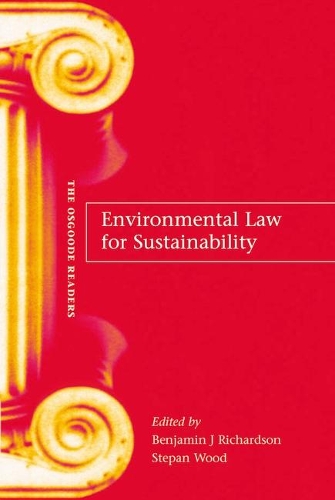
Environmental Law for Sustainability: A Reader
(Paperback)
Publishing Details
Environmental Law for Sustainability: A Reader
By (Author) Benjamin J Richardson
Edited by Stepan Wood
Bloomsbury Publishing PLC
Hart Publishing
9th March 2006
United Kingdom
Classifications
Tertiary Education
Non Fiction
344.046
Physical Properties
Paperback
320
Width 156mm, Height 234mm, Spine 25mm
734g
Description
The Reader presents critical new scholarship on law for sustainable development. Its contributors provide international and comparative perspectives on the current state of environmental law and its future directions. Aimed at both students and seasoned scholars, from law and wider social science backgrounds, the Reader's chapters go beyond conventional descriptions of environmental law and policy to a theoretical and interdisciplinary analysis of the role of law in sustainable development. The Reader starts from premise that to achieve an ecologically sustainable society, environmental law systems need to be sensitive to a wide array of institutional, social and economic issues and to emerging forms of environmental governance beyond conventional legal regulation. The Reader explores key current issues including future directions in "command" regulation; changing forms of public administration; risk assessment and precautionary regulation; ecological justice; public participation in environmental decision-making; indigenous peoples and the environment; industry self-regulation; economic instruments; sustainable finance; the state of international environmental law; and environmental law in developing countries. The chapters canvas developments at the international level and in a range of jurisdictions including Australia, Canada, European Union member states, the US and some developing countries. Contributors include Carolyn Abbot (Manchester), Klaus Bosselmann (Auckland), David Driesen (Syracuse), Steve Dovers (ANU), Jaye Ellis (McGill), Elizabeth Fisher (Oxford), Benjamin Richardson (Osgoode) and Stepan Wood (Osgoode).
Reviews
[this] book takes a refreshing look at environmental law in the context of sustainability, focusing on rigorous analysis and reflective consideration of the topics made relevant across jurisdictions...It will be...stimulating to established scholars in this area, but also those coming to the subject for the first time...the intellectually challenging approach, combined with a most reasonable price tag, mean that this book should easily earn a place in all environmental law libraries. -- Anne-Michelle Slater * Environmental Law Review, Volume 9 (1) (2007) *
This is a remarkable book, not only for its critical analysis of the law for sustainable development, but for the fact that it is, in this reviewer's knowledge, the only book suitable for scholars and students alike that undertakes a comprehensive, comparative approach to unraveling the complexities of the law for sustainable development in a manner that does not leave the reader wallowing in a state of confusion and uncertainty...This will be a useful reference for specialist topics, such as Indigenous Peoples, law and the environment and public participation in environmental decision-making as well as being suitable as a text in a foundation environmental law course...this book does an excellent job of covering the broad landscape of environmental law for sustainability and it is highly recommended. Michael Jeffery, QC -- Michael Jeffery, QC * Macquarie Journal of International and Comparative Environmental Law, volume 3 *
a collection of thought-provoking and condensed essays, addressing some of the key roles of environmental law from the viewpoint of diverse scholarsI can fully recommend this book to students, fellow academics, practitioners and government officials. -- Prue Taylor * New Zealand Journal of Environmental Law *
the book is remarkable for achieving coherence and unity in a work of such diversity and complexity. If Environmental Law for Sustainability was the only environmental law book a newcomer to the area had read, he or she would come away with considerable historic and general knowledge, as well as deep and insightful critiques on detailed and complex questions that are at the forefront of current issues facing law and sustainabilitya unique and very useful tool, not only for students taking their first steps on the path of sustainability law, but for well-seasoned travellers as well. -- Heather Mcleod-Kilmurray * Osgoode Hall Law Journal, Vol 45, No 1 *
The book's main appeal rests in its critique of both traditional and emerging areas of environmental law, and its ability to offer a truly interdisciplinary perspectiveits mixture of clear overviews of the current state of the law and critical debates makes it a stimulating read for both expert researchers and students new to the field. -- Kelvin Cheung * ELFline *
[This] is a fascinating book. It addresses some of the most topical issues in international environmental law and policy, and does so informatively and interestingly a stimulating and valuable contribution to the discourse on the interrelationship between environmental law and sustainability. -- Kate Miles * Review of European Community and International Environmental Law, Volume 15, No 3 *
It demonstrates the variety of the concept and provides substantial propositions for further discourse and research. -- Eike Michael Frenzel * European Public Law, Volume 14, Issue 1 *
Author Bio
Benjamin Richardson is a Professor at Osgoode Hall Law School of York University in Toronto. He formerly lectured at the Universities of Manchester and Auckland, and was a policy advisor for the IUCN. Stepan Wood is a Professor at Osgoode Hall Law School of York University in Toronto. He was previously an attorney with White & Case in New York and a law clerk to the late Justice John Sopinka of Canada's Supreme Court.
